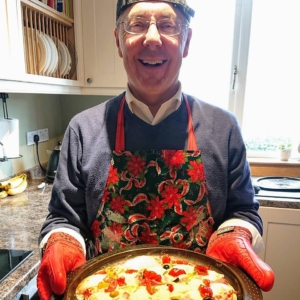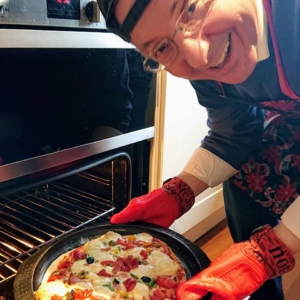Friendly Rivalry














“Do you have time for a game President?”
This question has become a regular one whilst I’m in the office once a week.
This week was no exception.
I do enjoy a game of table tennis.
I think my very best days are well behind me now though.
As a teenager growing up in Scotland, many an evening was spent at the local community centre with school friends, fine tuning my table tennis skills. Mum and dad were pretty good too.
I was always very competitive. Although, I could never beat dad.
It wasn’t until I was 16 that I had a breakthrough and won a match against him. Growing older, I’m not actually sure if I beat him, or he actually let me win, in order to encourage me further!
These days the goal is a simple one….. “To beat President!”
They have an extremely strong motive!
There are several good players amongst the missionary force at the moment.
Two of them are regularly in the office when I am in too, namely Leif Andersen and Atticus Snow.
Week in, week out – they ask me the question.
And week in, week out – I am still managing to hold my own and win – just!
Both are definitely improving.
Practice is an important way to improve skills.
It is repetition of skills during practice that enables you to learn from mistakes and become a much more confident player.
My practice time is extremely limited and won’t be changing anytime soon.
Their motivation is high, and their practice time is much higher than mine!
For the moment, I’m enjoying the victories whilst they last!
My conclusion – my days are numbered!
What is your motivation to succeed?
“Can anyone juggle?” I asked.
A few raised their hands and I invited them forward.
I gave them three balls each and asked them to show us how.
Admittedly, they were a little rusty, but after a few attempts, the basics returned.
“Who would like to learn how to juggle?” I asked.
A few raised their hands and I invited them forward.
I gave those who could juggle the assignment to teach those who came forward how to juggle.
The challenge – they had only two minutes to show them how.
After their time was up, the novice jugglers showed us their rudimentary skills.
The result – it wasn’t very pretty, with balls flying everywhere – but it was great fun!
After a few attempts, one even managed to complete a cycle of three balls through the air.
The Lessons –
As we grow older and develop in life, we have to learn how to juggle many responsibilities. Frequently, it can take lots of practice to get things right.
That day, I gave a new set of juggling balls to the willing learners.
Pleasingly a week later, one by one they told me of their significant improvement in their juggling skills. Each of them had taken time to learn the techniques of throwing and catching a ball. They had practiced with 2 balls and then ultimately juggled with 3. With lots of continuous practice, 4 balls won’t be a problem either.
Learning something new? Don’t get too disheartened and throw in the towel too soon!
Remember, practice and time are key principles in our learning, growth and development.
“It’s the centrifugal force” I said, as my daughter Cristi gave me a bit of a strange look!
In attempting to make home made pizza at the weekend for the first time ever, I learned a lot about the key ingredients and the due process of making the dough. Both are essential for perfect pizza.
Strong plain flour, yeast, salt, olive oil, warm water and a little warm milk mixed together create a perfect dough.
 Then the fun begins.
Then the fun begins.Kneading the dough on a well floured surface for 5 minutes creates a smooth and slightly tacky texture. Then, you pop the ball of dough into a bowl, cover it with a wet cloth, leave it for 90 minutes, allowing it to rise to perfection.
Time to knock back the dough.
Gently lifting the dough out from the bowl, kneading it again, then leaving it for another 45 minutes to rest a while. The passage of time is key.
Now, roller in hand, it was time to roll out the dough.
The first two bases were impressive and I determined not to toss the dough, frightened that I’d make a mess of my perfect creation! However, on the third base, after watching a “how to throw dough” video, I incorporated the toss into my routine. Gently balancing the rolled dough on my fingertips, I tossed it into the air, with a gentle rotating spin action at the same time and capturing it again on the back of my hand. Performing this action three times, allowed centrifugal force to stretch out the pizza base to perfection!
Adding on the toppings, making sure the oven was on full blast, pizza trays were already hot and getting the oven timings right were crucial finishing touches.
 The result. Perfect Pizza’s!
The result. Perfect Pizza’s!
However, it has to be said, although Pizza’s 1 & 2 were good, adding in the toss for Pizza 3, made the difference between good and great!
In my allegory filled mind, there are dozens of pictures forming about this due process. There are multiple comparisons to be made and lessons to be learned. Time, ingredients, process, heat, practice, that little extra toss.
What allegories come to mind for you?
To move from good to great, sometimes you just have to throw in that little extra…. (toss!)
Now to do it all again, this time Gluten Free!
‘The essence of strategy is choosing what not to do’ says Michael Porter.
In August 1993, I met my future Dutch father in law, Bep for the first time. I learned a lot about him that day, including the fact that he was an avid chess player and amongst the top players in the local club in town. I’m a novice at best, but soon a challenge was issued. Out came the board, chess pieces and a clock too! I’d never even see a chess clock! Needless to say I was thrashed and humbled a few times that day.
Over many years of playing chess with Bep, I observed and learned much about him.
– he was methodical
– he valued time
– he planned carefully
– he was patient
– he anticipated
– he was exact
These characteristics were a pattern for his life. He was a highly skilled carpenter to trade and these qualities I presume were finely tuned over many years of practice.
Sadly, he is gone now.
I did manage a couple of wins over all the ensuing years and yet, I have never forgotten those powerful lessons he taught me.
The clock of life never stops ticking and each of us always needs to carefully consider our next move. What will yours be today?